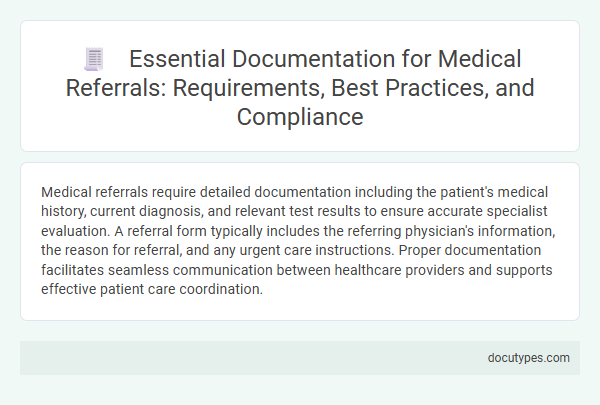Medical referrals require detailed documentation including the patient's medical history, current diagnosis, and relevant test results to ensure accurate specialist evaluation. A referral form typically includes the referring physician's information, the reason for referral, and any urgent care instructions. Proper documentation facilitates seamless communication between healthcare providers and supports effective patient care coordination.
Introduction to Medical Referral Documentation
Medical referral documentation is essential for ensuring continuity of care between healthcare providers. It includes detailed patient information, clinical findings, and the reason for referral. Proper documentation facilitates accurate diagnosis, treatment planning, and improves patient outcomes.
Key Components of a Referral Document
Medical referrals require precise documentation to ensure effective communication between healthcare providers. Key components of a referral document include patient identification details, a clear description of the medical issue, and the reason for referral. Your referral should also contain relevant medical history, current medications, and any diagnostic test results for a comprehensive evaluation.
Patient Information Requirements
What patient information is necessary for medical referrals? Essential patient details include full name, date of birth, and contact information. Medical history, current medications, and insurance data are also required to ensure accurate referrals.
Clinical Details and Justification
Medical referrals require comprehensive clinical details to ensure accurate diagnosis and appropriate specialist intervention. Essential information includes the patient's medical history, current symptoms, and previous treatments.
Justification for the referral must clearly explain the necessity, outlining the expected benefits and urgency of specialist evaluation. This documentation supports continuity of care and aids in prioritizing patient needs within the healthcare system.
Essential Supporting Documents
Medical referrals require specific documentation to ensure accurate patient evaluation and seamless communication between healthcare providers. Proper supporting documents facilitate timely diagnosis and treatment planning across medical specialties.
- Referral Letter - A comprehensive letter from the primary physician detailing the patient's condition and reason for referral.
- Patient Medical History - A complete record of past illnesses, surgeries, medications, and allergies relevant to current health issues.
- Diagnostic Test Results - Recent lab results, imaging reports, and other diagnostic data supporting the referral's clinical rationale.
HIPAA and Data Privacy Compliance
Medical referrals require thorough documentation to ensure effective patient care and compliance with legal standards. Proper handling of sensitive information is crucial to uphold HIPAA regulations and protect patient privacy.
- Patient Consent Form - Documents patient authorization for sharing medical information between providers in compliance with HIPAA requirements.
- Medical History and Clinical Notes - Provides detailed health information necessary for accurate diagnosis and treatment by the referred specialist.
- Referral Letter - Contains the referring physician's assessment and reason for referral, maintaining data privacy standards in secure communication.
Common Documentation Errors to Avoid
Proper documentation is essential for efficient and accurate medical referrals. Common errors in referral documentation can delay care and affect patient outcomes.
- Incomplete Patient Information - Missing details such as patient history or contact information can hinder the referral process.
- Incorrect or Illegible Provider Details - Errors in referring provider names or unclear handwriting cause confusion and delays.
- Lack of Clear Reason for Referral - Vague or missing clinical indications prevent specialists from understanding the urgency and purpose of the referral.
Ensuring accuracy and completeness in referral documentation improves coordination and patient care quality.
Best Practices for Efficient Referral Documentation
Medical referrals require precise and thorough documentation to ensure patient care continuity and effective communication between healthcare providers. Essential documents include patient history, reason for referral, and relevant clinical findings.
Best practices for efficient referral documentation involve detailed yet concise medical summaries that highlight the primary diagnosis and treatment plan. Clear identification of the referring and receiving providers, along with updated patient contact information, enhances referral tracking. Accurate documentation reduces delays and supports better patient outcomes.
Role of Electronic Health Records in Referrals
| Documentation Type | Description | Role of Electronic Health Records (EHR) |
|---|---|---|
| Patient Medical History | Comprehensive summary of past diagnoses, treatments, allergies, and ongoing conditions. | EHR systems store and organize your medical history, allowing easy access for healthcare providers during referrals to ensure continuity of care. |
| Referral Request Form | Official document from the referring physician detailing the reason for referral and clinical information. | EHR software generates standardized referral forms electronically, reducing errors and facilitating faster processing. |
| Diagnostic Test Results | Lab reports, imaging studies, and other diagnostic findings relevant to the referral. | EHR enables the secure sharing of test results directly with specialists, minimizing delays and unnecessary retesting. |
| Medication Records | List of current and past medications prescribed to the patient. | Medication details stored in EHR help specialists review treatments and avoid drug interactions. |
| Insurance Information | Details about patient health coverage and authorization requirements. | EHR systems often integrate insurance data to ensure referral approvals comply with policy terms. |
What Documentation Is Necessary for Medical Referrals? Infographic

